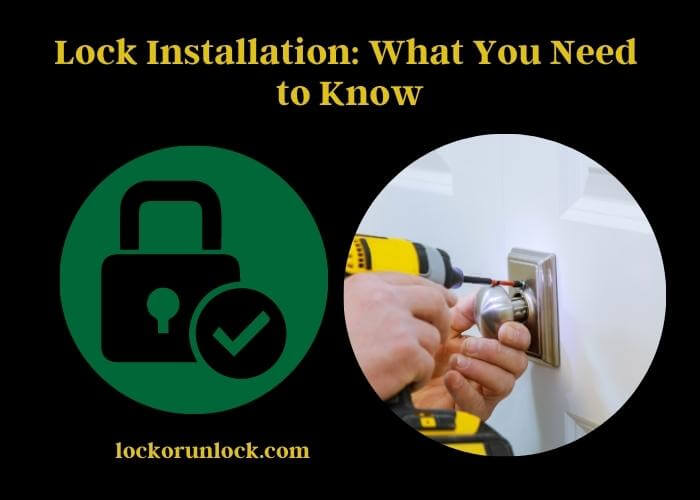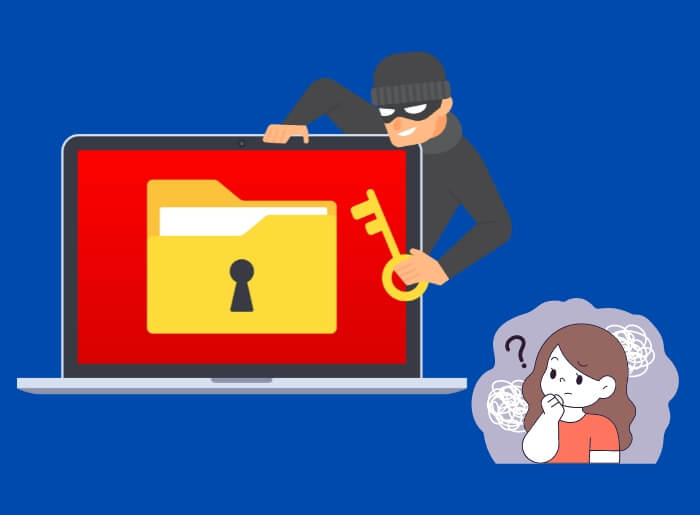Locks are a fundamental aspect of security, protecting our homes, businesses, and belongings from theft and intruders. A poorly installed lock can compromise the security of your property, leaving you vulnerable to theft and other crimes. While it may be tempting to install a lock yourself or go with the cheapest option, hiring a professional for lock installation ensures that the job is done correctly and provides you with peace of mind.

Types of Locks
When it comes to lock installation, it’s essential to choose the right type of lock for your specific needs. There are many types of locks available, each with its pros and cons. Here are some of the most common types of locks you may consider:
Deadbolts
Deadbolts are the most popular type of lock for external doors because they offer excellent security. They come in two varieties: single-cylinder and double-cylinder. Single-cylinder deadbolts use a key on the outside and a thumb turn on the inside, while double-cylinder deadbolts use a key on both sides.
Mortise Locks
Mortise locks are commonly found in older homes and are installed within the door frame itself. They offer excellent security and are often used on commercial doors. They come in two varieties: mortise cylinder and rim cylinder.
Electronic locks
Electronic locks offer keyless entry and other advanced features such as remote access and voice control. They are becoming increasingly popular because they are convenient and easy to use. Electronic locks can be powered by batteries or hardwired into your home’s electrical system.
Smart Locks
Smart locks are a type of electronic lock that can be controlled via a smartphone app. They offer advanced features such as remote access and the ability to grant access to others through the app. Some smart locks also come with a backup physical key in case of a power outage.
Padlocks
Padlocks are portable locks that can be used on doors, gates, and other items. They come in various sizes and are typically made of hardened steel or brass.
When choosing the right type of lock for your needs, consider factors such as security, convenience, and budget. It’s essential to choose a lock that meets your specific needs and provides you with the level of security you require. A professional locksmith can help you determine which type of lock is best for your situation.
Why is Lock Installation Important?

Lock installation is important for several reasons.
1. It provides security to your property by preventing unauthorized access. A properly installed lock ensures that only the authorized person has access to the property.
2. Lock installation is crucial for ensuring the safety of the occupants of a building or property.
You can safeguard your property from burglars, intruders, and other criminal elements by installing the lock. Lock installation is necessary for compliance with building codes and regulations. It ensures that your property meets the required safety standards, which is essential for obtaining insurance and avoiding legal issues.
What Tools Need for Lock Installation?
To install a lock, you will need several tools, including:
| Screwdrivers | You will need a variety of screwdrivers, including Phillips and flathead screwdrivers, to remove the old lock and install the new one. |
| Drill and drill bits | You may need to drill new holes or enlarge existing ones to fit the new lock. You will need a drill and a set of drill bits to do this. |
| Tape measure | To ensure that the lock is installed at the correct height and location, you will need a tape measure. |
| Chisel | You may need to chisel out a section of the door frame to accommodate the new lock mechanism. |
| Hammer | You will need a hammer to strike the chisel and make the necessary cuts in the door frame. |
| Level | A level will ensure that the lock is installed evenly and straight. |
| Pliers | Pliers may be needed to hold small screws and other hardware in place while you tighten them. |
| Lockset installation kit | This kit contains all the necessary hardware and tools to install a lockset, including screws, bolts, and strike plates. |
Having these tools ready will make the lock installation process much easier and smoother.
Preparation Before Lock Installation
Before a lock installation professional arrives to install your new locks, there are several preparations you can make to ensure that the installation process goes smoothly. Here are some things to keep in mind:
Choose the Right Lock
As discussed earlier, choosing the right type of lock for your needs is essential. Make sure you have decided on the type of lock you want to install before the professional arrives.
Clear the Area
Make sure the area around the door where the lock will be installed is clear of any obstructions. This includes furniture, rugs, and any other items that may get in the way during installation.
Provide Access
Make sure the lock installation professional has easy access to the door where the lock will be installed. This may involve moving cars or other obstacles that may be in the way.
Remove the Old Lock
If you are replacing an existing lock, make sure you remove it before the professional arrives. This will save time and ensure that the installation can be completed more quickly.
Prepare the Door
If you are installing a new lock on a brand-new door, make sure it is properly hung and aligned before the installation. If the door is not hung correctly, it can affect the performance of the lock.
Have Keys Ready
Make sure you have a set of keys ready for the new lock. If the lock is a high-security lock, the keys may need to be specially cut, so make sure you have made arrangements for this ahead of time.
Cost of Lock Installation
The cost of lock installation can vary depending on several factors, including the type of lock, the complexity of the installation, and your location. On average, you can expect to pay between $50 and $300 for lock installation, with electronic locks being on the higher end of the spectrum.
While it may be tempting to go with the cheapest option, investing in a high-quality lock and professional installation can save you money in the long run.
Maintenance and Repair of Locks
After your locks are installed, it’s important to maintain them properly to ensure that they continue to provide the necessary level of security. Here are some tips for maintaining and repairing your locks:
Keep the Locks Clean
Regularly clean your locks with a dry cloth to remove any dirt or debris that may have accumulated. You can also use a mild cleaner to remove any stubborn dirt or grime.
Lubricate the Locks
Use a lubricant such as graphite or silicone spray to keep your locks operating smoothly. Apply a small amount of lubricant to the key and insert it into the lock to distribute the lubricant evenly.
Check the Lock Mechanisms
Regularly check the lock mechanisms to ensure that they are operating smoothly. If you notice any sticking or difficulty turning the key, it may be time for maintenance or repair.
Repair or Replace Damaged Locks
If your locks are damaged, it’s important to repair or replace them as soon as possible. A damaged lock can compromise your security and make it easier for intruders to gain access to your property.
Contact a Professional
If you notice any issues with your locks, it’s important to contact a professional locksmith for maintenance or repair. Attempting to repair the locks yourself can cause further damage and compromise your security.
Regular maintenance and prompt repair of any issues can help prevent security breaches and keep your property safe.
Advantages of Lock Installation
Lock installation provides several advantages:
Increased security: Installing a lock increases the security of your property by preventing unauthorized access. This helps to deter burglars, intruders, and other criminal elements from gaining entry.
Safety: A lock provides safety for the occupants of a building or property. It ensures that only authorized personnel can access certain areas of the property, such as private rooms or storage areas.
Compliance with building codes: Installing a lock ensures that your property meets the required safety standards and building codes. This is important for obtaining insurance and avoiding legal issues.
Convenience: A lock makes it easier to manage access to your property. You can give keys or access codes to authorized personnel and change them as needed.
Peace of mind: Installing a lock provides peace of mind, knowing that your property is secure and protected. It reduces the risk of theft and other crimes and ensures that your property is safe for your family or employees.
Lock installation is essential for maintaining the security and safety of your property. It provides peace of mind, convenience, and compliance with building codes.
Last Assumption
Installing the right locks is an essential step in securing your property and protecting your belongings. By choosing the right type of lock, hiring a reputable and experienced lock installation professional, and properly maintaining and repairing your locks, you can ensure that your property remains safe and secure.
It’s important to take the time to research the different types of locks available and choose the one that best fits your needs. Hiring a licensed and insured lock installation professional can give you peace of mind knowing that your locks are installed correctly and that you are protected in case of any damage or injury during the installation process.
Proper maintenance and repair of your locks can also go a long way in ensuring their longevity and effectiveness. Regular cleaning, lubrication, and inspection can help prevent issues and identify any problems early on.

Hey, I think your website might be having browser compatibility issues. When I look at your website in Chrome, it looks fine but when opening in Internet Explorer, it has some overlapping. I just wanted to give you a quick heads up! Other then that, awesome blog!